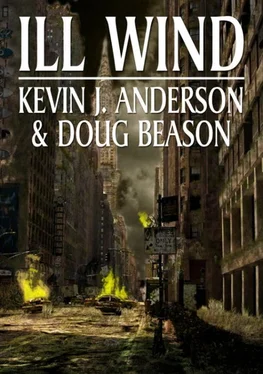“Navy Zero Six, please be advised—” The speaker went dead and the cockpit sounded weirdly silent except for the rushing wind. At the same instant he felt a gigantic sagging as the engines died, the A/F-18’s electrical systems shut down. What the hell happened to the backup? The system was isolated from the main engine—this couldn’t happen!
Adrenalin and split-second fear switched off the questions in his mind. Deal with them later. Bobby immediately pushed as hard as he could to lower all flaps to extend the camber in an attempt to increase his lift.
He spotted Double Eagle airport off to the left; he had vectored in too far south. Cursing under his breath, he inched the fighter’s nose to the left, trying not to do anything that would send the already precarious craft out of control. He had to punch out—no way could he bring this fighter in. No way.
But what had gone wrong with Barfman? Had he tried to eject, only to fail for some unknown reason? Or had Barfman simply waited too long, kept his head buried in the controls?
He saw a long stretch of green in front of him—the Rio Grande river. What a place to run out of gas! He frantically tried to turn the craft, but felt a growing wobble.
The craft would lose it any second now. Slamming his helmeted head against the back of his seat, he reached down and grasped the ejection handles. He’d crash through the canopy if it didn’t blow open, but better that than staying with the jet and digging a crater in the desert. He looked straight ahead, closed his eyes, and pulled up as hard as he could.
An instant later he felt the shock of cold air, a sound that overwhelmed him—wind, crashing, tearing. His right leg and mouth felt torn apart. He was thrown from the seat, twisting. Attached to the parachute a line in front of him snaked out, ripped into the howling wind.
He felt himself tumbling. The parachute started to open. He had to clamp his mouth shut to keep from vomiting.
It was going to be one mother of a hard landing. Bobby gritted his teeth and tried to keep conscious. The parachute tugged him upward in an effort to slow his plunge.
Below him, he watched his jet explode into the desert floor.
Iris Shikozu’s portable phone no longer worked, but the clunky old model in the bedroom of her apartment still functioned. Different plastics broke down at different rates. The plague was spreading like a flood, wiping out the entire city.
She carefully pushed buttons, hoping the equipment wouldn’t fall to pieces as she dialed. She had to talk to somebody. The world seemed to close around her as everything broke down. On her bedroom wall, posters of middle-aged rock groups stared down at her, offering silent sympathy for her predicament.
In only a day the news had become intermittent . The plague had been spreading quietly since the Prometheus spraying, infecting numerous items, metabolizing gasoline first and then attacking other polymers, until components began to break down all at once. All at the same time.
The radio news told stories of riots in South Africa, a major stock exchange crash in Tokyo, communications blackouts from various parts of the world. The President himself was stranded out of the country, and now the Vice President had been stuck in Chicago when all aircraft were grounded. Everything was happening too fast.
She listened to the buzzing ring against her ear as she waited for someone to answer. More often than not, the phones had been out of order. She suspected that plastics in the various telephone substations had dissolved, but the phone company had managed to reroute most of the calls. So far.
Francis Plerry, her contact at EPI, answered the phone; Iris launched into her rehearsed speech before he could hang up on her.
“I’ve been waiting for you to return my calls, Mr. Plerry. I called five times yesterday. I have some information regarding the spread of the Prometheus plague and how it is attacking plastics.” She sat down on her double bed, pulling the phone after her, calmed now that she could finally speak to someone. “I need to be put in touch with the other research teams addressing the issue. Have you even established other teams?”
“Miss Shikozu,” Plerry said, “I received your messages, and I’m sorry I haven’t gotten back to you. This place has been a zoo since rumors of the plague started. Er… I’m sure you understand that a lot of these people don’t want to talk to you.”
Iris felt like he had slapped her in the face. “No, I don’t understand that at all. Why wouldn’t they want to talk to me?”
“Well…” Plerry sounded flustered. “ You were the one who inspected the Prometheus microorganism and deemed it safe. Obviously, few people are interested in your theories after you so grossly misinterpreted the data.”
“That’s bullshit, Plerry! Dr. Kramer gave me a bogus control sample to analyze, then sprayed something completely different on the oil spill—”
Plerry kept right on talking. “—there may actually be certain charges of criminal negligence and endangerment of public health when all this blows over.”
Iris rolled her eyes. When all this blows over? Right! Todd Severyn had Plerry pegged from his first impression: this guy is out of touch with reality.
“Yeah, Plerry, we’ll talk about that later. For now I’ve got some information for the other teams. The Centers for Disease Control, the NIH, the Department of Defense, and the petroleum industry all better throw their research muscle into this.”
Plerry hesitated on the other end of the line, and she could picture his Adam’s apple bobbing up and down. “I assure you, Miss Shikozu—”
“That’s Dr. Shikozu, and I’m damned tired of you ‘assuring’ me!” she said. “Listen to me. Most of the equipment in my lab is already shot, so I can’t run any analyses, but I have been able to piece together some of my own results. I know why Prometheus is going after plastics.
“The microorganism primarily dissociates the octane molecule, which is made up of eight carbons in a chain, surrounded by hydrogen atoms. Most petroleum plastics are just longer polymers made up of shorter hydrocarbons, interlinked. Kramer engineered the new strain of Prometheus to break out eight-carbon chains from longer polymers, as well as some ring hydrocarbons. It can reach into heavy petroleum molecules and snip out bite-sized molecules. That’s how it breaks down plastics! Any plastic that doesn’t have eight-carbon segments should still be safe—”
Plerry cut her off. “Thank you, Dr. Shikozu. The working teams have already come up with that independently. But it’s not always true. We have not been able to come up with a simple explanation for why Prometheus attacks certain plastics and leaves others alone. Nylon seems to resist the plague, and so does polyvinyl chloride, PVC—which should be one of the most easily affected plastics. But even that may change, as the microorganism adapts to new food sources. We just don’t know, but we are working round the clock to look for answers.”
“Have you gotten in touch with Kramer’s assistant Mitch Stone?” Iris persisted. No one had ever given her such a cold brush-off before. She’d earned a little more respect and consideration. “He might know something.”
“The research teams have already commandeered Dr. Stone and his expertise. He is working with Oilstar to interpret Dr. Kramer’s notes right now.”
Iris felt exasperated. She was never good at sitting still, and she couldn’t just wait for somebody else to work on the problem. She wanted to be involved. She wanted to be somewhere she could put her hands on the problem. She stood up again and brushed her hand across the bedspread to smooth the wrinkles. “Maybe I could assist them.”
Читать дальше












